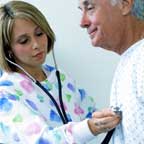Heart Disease: It Could Happen To You

Most women you ask believe heart disease is a “man’s disease” and that women don’t need to be concerned about it—at least until much later in life. However, we do need to be concerned about this debilitating disease much earlier—in fact, as early as our forties. That’s exactly why OSF Saint Francis Heart Hospital and OSF Saint Francis Women’s Services are developing a gender specific heart program. We’re in no way excluding the men in our lives from being heart healthy or from raising their awareness, but we’re working to bring Peoria women’s awareness up to the level of our male counterparts.
It’s so important that women realize sex matters. With heart disease, though, it really matters. Symptoms in men and women are different. Women may only experience fatigue and insomnia. How many of you have those symptoms? Women may never experience the crushing chest pain we always hear about. Women may have jaw pain or pain radiating down their arm or fatigue and insomnia.
Women must become aware that there are important steps they can take to be in charge of their heart health. If you smoke, get help to stop. If your blood pressure is out of control, get medication to bring it down. If you’re overweight, get into a program where education occurs and a professional monitors exercise and progress.
There’s a true misconception that men with heart disease have a poorer prognosis than women. In fact, more women die in the hospital of heart disease than men, and more women die in the first year after having a heart attack than men.
Women need to be aware that testing should be different from what their husband or brother may experience. A treadmill test may register a false positive in women, but when combined with the Thallium test, the results are much more accurate.
When women go for their annual exam, they need to bring up heart disease and talk about how it relates to them with their physician. As women age, they begin to accumulate stored fat around their waist. This isn’t healthy, and discussing ways to eat healthy and lose that extra girth is important.
High cholesterol is another risk factor women need to discuss with their physician. There are many facets of cholesterol women need to know. It isn’t just how high cholesterol is, but also how LDL and HDL relate to triglycerides and other risk factors that are important.
Three risk factors—stress, hormones, and alcohol consumption—need to be on the “discuss with physician” list. Stress is no longer strictly a male issue. Since women have broken through the glass ceiling, the amount of stress they experience isn’t much different than men. As one female physician stated, “As I was speaking at a conference, I had the thought, ‘We’re out of toilet tissue, and I must stop for some on the way home.’” How many men would think of this? When women came into the workplace in greater numbers, they didn’t give up their other “jobs” at home. They simply added to the work. Stress is a byproduct of taking on that additional responsibility.
Many women are confused about hormones and heart disease. If women are symptomatic because of menopause, finding the appropriate hormone regimen is important to both their mental and physical wellbeing. Discussing symptoms with their physician can help the physician determine that regimen.
Alcohol consumption should be limited to two drinks daily. Women should discuss alcohol consumption with their physician regularly, note any increase in that consumption, and monitor the increase.
Because we’re seeing more obesity in women, we’re also seeing more diabetes and the metabolic syndrome. Women must be pro-active in discussing these conditions with their physician to be assured they’re doing everything possible to prevent them from occurring. TPW
